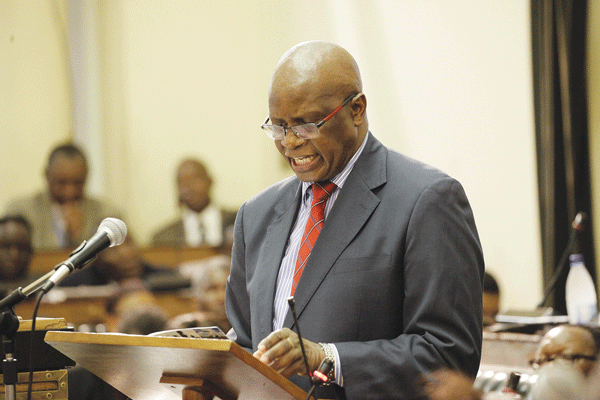
FINANCE minister Patrick Chinamasa has defended his decision to borrow heavily, in the process overshooting government expenditure targets last year, saying the move was necessitated by the need to urgently import grain to stave off hunger affecting nearly four million people.
By Fidelity Mhlanga

Addressing stakeholders at the Institute of Chartered Accountants of Zimbabwe (Icaz) winter school in Victoria Falls at the weekend, Chinamasa indicated that the “large chunk” of amounts borrowed was spent on grain importation.
“Last year was a very bad year for us. If you look at the borrowing that we did, you find that the large chunk was on the importation of grain. And I don’t think that anyone would have argued that we should not borrow to keep our people alive,” he said.
In his mid-term fiscal review statement last Thursday, Chinamasa told Parliament that budget expenditures for 2016 amounted to $4,902 billion, against planned expenditure of $4bn, resulting in expenditure overruns of $902,2 million.
“I am also aware that over this issue, we have had fights. Fortunately, the government and I were on one side and some other people, who viewed that we should do rather what is called classical economics, that if you don’t have revenue, don’t spend. I don’t share that view. For me, I view that we can borrow depending on why and where you apply the money,” he said.
The Treasury boss admitted that borrowing was crowding out the private sector, but was quick to defend his stance, saying the move was meant to capitalise struggling State enterprises.
“Some of the borrowing, while crowding out the private sector yes, has been assisting the private sector. There are some companies which no longer have capacity to borrow which we have resuscitated through the TBs (Treasury Bills). We capitalised some of the State enterprises, which we considered critical like ZB Bank, POSB Bank and IDBZ (Infrastructure Development Bank of Zimbabwe). For me, that is not money wasted,” he said.
- Chamisa under fire over US$120K donation
- Mavhunga puts DeMbare into Chibuku quarterfinals
- Pension funds bet on Cabora Bassa oilfields
- Councils defy govt fire tender directive
Keep Reading
According to the 2016 annual budget review, government incurred unbudgeted expenditure of $134m, with some of the money going towards recapitalisation of Cotton Company of Zimbabwe ($30,5m), Agribank ($30m), ZB Bank ($20m), POSB ($20m), IDBZ ($18,7m); and Small and Medium Enterprise Development Corporation ($15m).
Of the $2,1bn worth of Treasury Bills and bonds issued in 2016, only $356,3m was to finance the budget deficit, while $1,7bn was to honour outstanding legacy debt.
Failure to contain the budget deficit and borrowing requirements has serious economic and financial implications, especially when support to development expenditures to stimulate production is insignificant.
“The expenditure is stable. It’s very near the budget. But even at that level that we have tried to maintain. It’s still skewed very much in favour of wages and the current expenditure and nothing or very little is left for operations and services delivery and infrastructure. Something like 55% of revenue should go towards wages the way it is now at 91%,” Chinamasa said.
“So those are the challenges that we face. We are beginning to see some savings as a result of some of the rationalisation measures that we are undertaking and implementing. All is not lost. In fact, for me, as I always say, I sleep well because of the clear and firm foundation that we are laying for the take-off of this economy.”











